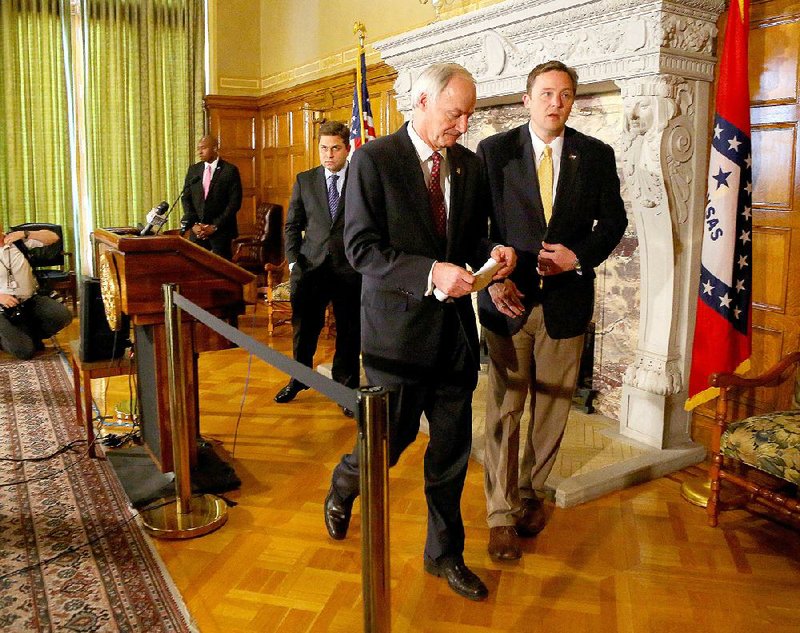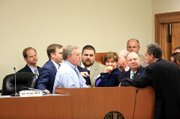A day after signing his first veto and facing high-profile pressure to veto a second bill, Gov. Asa Hutchinson told lawmakers to rework the bill on his desk aimed at expanding religious freedoms but that critics said encouraged discrimination.
Document set
Religious Freedom Restoration Act
The morning after the arrival of House Bill 1228 on his desk, the first-term Republican governor said the bill, also known as the Religious Freedom Restoration Act, did more than he had envisioned when he said he supported it.
He then asked that the Arkansas Legislature take it back and try again.
"It was my intention -- because the federal [Religious Freedom Restoration Act] law does not cover state causes of action -- that we have a similar law in the state of Arkansas," Hutchinson said. "To do that, changes need to be made. The bill that is on my desk at the present time does not precisely mirror the federal law."
Eventually, the governor's request was met. The Senate debated late into the night and passed a thinner version of the bill that some critics found more palatable, and one that puts replacement legislation in line with federal law.
The governor's announcement was met by cheers from activists and Democrat lawmakers who contend that HB1228 would result in more discrimination against the gay community, a community that under Arkansas law has no civil rights protections.
Chad Griffin, head of the Human Rights Campaign, which fought against HB1228, said he was encouraged by the announcement.
"The headline here is the governor's listening," Griffin said. "He's listening to business leaders in the state and across the country, and the governor's listening to tens of thousands of fair-minded Arkansans who've spoken up."
Jerry Cox, the head of the Arkansas Family Council and a big backer of the effort by Rep. Bob Ballinger, R-Hindsville, had expected Hutchinson to sign the bill into law. Wednesday's developments were unanticipated.
"I think a lot of people were surprised," Cox said. "The governor is entitled to ask what he wants to ask. The Legislature is obviously entitled to accommodate or not accommodate what the governor wants."
Ballinger said he can support the type of bill envisioned by Hutchinson.
"Obviously the one that is sitting on the governor's desk was my first choice," Ballinger said. "But this [new bill] is a good opportunity. I felt like it protects the citizens of the state of Arkansas that they'll be able to believe what they want to believe without government interference and that's ultimately what I was looking for."
Similar legislation in Indiana has prompted an uproar in that state, one that opponents of Arkansas' bill said was instructive.
Hutchinson said lawmakers, even with good intentions, needed to pass a bill that not only struck a balance between religious freedom and nondiscrimination, but that shows those outside the state what values rule in Arkansas.
"How do we as a state communicate to the world that we are respectful of a diverse workplace and we want to be known as a state that does not discriminate but understand tolerance," Hutchinson said. "That is the challenge we face. Making this law like the federal law will aid us in the [effort]."
Two new bills
Through a rushed afternoon of meetings, phone calls and text messages, lawmakers worked to honor the request of the state's leader.
After the House of Representatives failed to recall HB1228 from Hutchinson's desk, the Senate halted its session to convene its Judiciary Committee. Wednesday afternoon, it passed two bills, Senate Bills 229 and 975, both of which are nearly identical to the nation's federal Religious Freedom Restoration Act.
The reason for two bills was that legislators were concerned that by co-opting previously filed legislation and amending it greatly, their actions could be challenged as unconstitutional.
Ballinger, the sponsor of HB1228, said he wouldn't ask the House to approve the bill sponsored by Sen. Gary Stubblefield, R-Branch, if Stubblefield doesn't want him to do so and he won't ask the House to approve the bill sponsored by Sen. John Cooper, R-Jonesboro, because it was not designed to be a Religious Freedom Restoration Act bill.
Sen. Jeremy Hutchinson, R-Little Rock, said Ballinger wanted to use Stubblefield's bill to mirror the federal law, although Stubblefield hasn't given authorization for that to happen.
"This is not ideal. It should have been done weeks ago. We were trying to make the best out of a difficult situation," Hutchinson said.
HB1228 by Ballinger would have prohibited laws or ordinances that "substantially burden a person's right to exercise of religion" unless it as necessary to "further a compelling state interest."
State restrictions would only be allowed if they were "the least restrictive means of furthering the compelling governmental relief."
But other language in the bill would have allowed "appropriate relief" in the form of damages and court costs, and would have allowed legal action between private entities, not just government regulations, an aspect that Hutchinson said he wanted removed all along.
Supporters of the bill point out that there are about 20 other states with similar protections in place and that the bill was similar to the federal Religious Freedom Restoration Act, which was signed into law by then-President Clinton in 1993.
But head of the Arkansas Policy Project, and a member of the Arkansas Citizens First Congress, Bill Kopsky, said the state legislation is broader than the federal law.
By including corporations and other associations as "people," the bill's protections could lead to excessive litigation or widespread discrimination, he said.
A United Methodist pastor Steve Copley, who spoke at a Capitol protest earlier in the day, said the broad language could not only lead to discrimination of the gay community but to anyone.
"[HB 1228] could discriminate against me as a Christian," he said. "It's time... [to make sure] religion can never be used as a weapon to discriminate against others."
Many demonstrators, and Democrats, wanted the new legislation to include language that would prohibit the law from being used to discriminate.
Earlier this week, a Democrat legislator asked Ballinger if he would be willing to add language that would resolve that and Ballinger said it wasn't necessary because HB1228 wasn't discriminatory in nature.
After the Senate Judiciary Committee settled on language for a new bill, Sen. Linda Chesterfield, D-Little Rock, said the new legislation was a compromise that wasn't "perfect" but it was better than HB1228.
"Everyone wants everything ... there were those who wanted to have no discrimination. There were those who wanted to have what Rep. Ballinger already had," Chesterfield said. "We have fought this battle all day long. ... We have come out with a bill that I know is much better than what we had. ... It provides more protections for the LGBT [lesbian, gay, bisexual and transgender] community than what we had under 1228."
Rep. Laurie Rushing, R-Hot Springs, who is a co-sponsor of one of the new bills and supported Ballinger's original bill, said she doesn't view Ballinger's bill as discriminatory. But she said there was discussion within the freshmen caucus of adding language that would bar discrimination.
Ultimately, she said, lawmakers are going home with some sort of religious protection for voters.
"I think the big objective is we don't want to leave here without a RFRA in place," she said. "We want to maker sure there is one in place; that's what we were sent here to do by our constituents."
Going Forward
Though HB1228 first passed in the House on Feb. 13 in a 72-20 vote, the bill didn't draw major organized opposition until recently.
On Sunday, the Human Rights Campaign organized a rally that drew about 700 people, including the state's former attorney general, Democrat Dustin McDaniel.
The next day, the Capitol was swarmed by hundreds of demonstrators, who returned again the next two days for a flurry of speeches and events aimed at trying to get Hutchinson to veto the bill.
Beyond grass-roots pressure, several business figures, including officials from Bentonville-based Wal-Mart Stores Inc. and Little Rock-based Acxiom, urged Hutchinson to veto Ballinger's bill, warning of potential losses to economic development that have played out in response to similar legislation in Indiana.
Even the state's former first lady, former Secretary of State Hillary Rodham Clinton, urged Hutchinson to veto the bill that she said would allow for discrimination of the gay community.
Not long after Hutchinson asked lawmakers for a different bill, Wal-Mart sent out an announcement:
"We commend Governor Hutchinson and legislative leaders for reconsidering HB1228," the statement read. "We clearly support the importance of religious freedom and encourage the legislature to make certain any legislation does not encourage discrimination."
Kopsky said he and other demonstrators were also thrilled by Hutchinson's request and the follow-through by lawmakers, although, he said he would have liked to see explicit nondiscrimination language in the bill.
"We think it's a very positive change to the bill," Kopsky said. "I think the legislators and the governor have started a conversation about equity and opportunity, and it's a good conversation we should have."
Cox said he was dispirited that much of the debate over the bill centers on the idea that it permits discrimination.
"If a person feels that the government, an ordinance, a policy or a law is a burden to their religious freedoms then they have the prerogative to go to court," Cox said. "They may or may not win, that's what this law is about."
Cox said he and his staff are, like many, still digesting the proposed replacement to Ballinger's bill.
"At this point it's too early for us to say if we like it or not. At the end of the day we might come out and say it's a great bill or we may look at it and say it's half of what we wanted," Cox said. "I don't know at this point exactly what we'll say about [the new bills]."
On Wednesday, Hutchinson said that years ago, such legislation wouldn't have been so "divisive." But times have changed, he said, pointing out that his own son signed an online petition urging him to veto the legislation.
"There is clearly a generational gap on this issue," Hutchinson said. "So where are we now?"
The bills went to the House Judiciary Committee where they are scheduled for discussion today.
Though Democrats pointed out there weren't enough Republican votes to pull HB1228 back from the governor's desk, Rushing said she felt like the new religious protections had a good chance of passage.
"I feel confident," Rushing said.
Metro on 04/02/2015





